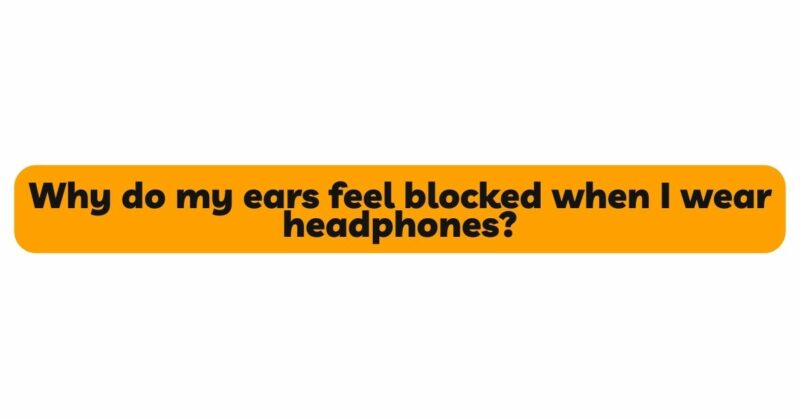Headphones have revolutionized the way we consume audio content, providing a personalized and immersive listening experience. However, many individuals encounter a peculiar sensation of their ears feeling blocked when wearing headphones. This phenomenon, often described as “ear blockage,” can be discomforting and frustrating, interfering with the enjoyment of music, podcasts, and calls. In this comprehensive article, we will delve into the various reasons behind this ear blockage and explore the contributing factors that lead to this sensation. Furthermore, we will provide practical solutions to alleviate the discomfort and enhance your headphone experience.
Understanding Ear Blockage: The Anatomy of the Ear
Before exploring the causes of ear blockage while wearing headphones, it is crucial to understand the intricate anatomy of the ear. The ear consists of three main parts: the outer ear, the middle ear, and the inner ear.
- Outer Ear: The outer ear, also known as the pinna, is the visible part of the ear that collects sound waves and directs them into the ear canal.
- Middle Ear: The middle ear is an air-filled space located behind the eardrum. It houses the three smallest bones in the human body, known as the ossicles (malleus, incus, and stapes). The ossicles amplify and transmit sound vibrations from the eardrum to the inner ear.
- Inner Ear: The inner ear is a fluid-filled structure that contains the cochlea, responsible for converting sound vibrations into electrical signals sent to the brain. Additionally, the inner ear houses the vestibular system, which plays a crucial role in maintaining balance.
Factors Contributing to Ear Blockage When Wearing Headphones
- Earphone Design and Fit
The design and fit of headphones play a significant role in causing ear blockage. In-ear headphones, also known as earbuds or ear tips, are designed to sit inside the ear canal. Improperly fitted ear tips can create a seal, which may cause the sensation of blocked ears due to reduced airflow. On the other hand, over-ear or on-ear headphones may exert pressure on the outer ear, leading to a feeling of blockage.
- Ear Wax Build-Up
Accumulation of earwax, also known as cerumen, is a common cause of ear blockage when using headphones. Earwax acts as a natural protective barrier, preventing debris and bacteria from entering the ear canal. However, excessive earwax can become impacted, leading to a sensation of fullness and blockage in the ear.
- Infections and Allergies
Infections in the ear canal or allergies can cause swelling and inflammation, leading to a blocked feeling. Using headphones in such conditions can exacerbate the discomfort and may further aggravate the blockage sensation.
- Ear Sensitivity
Some individuals have sensitive ears, and the pressure applied by headphones, especially in-ear models, can trigger discomfort and a perception of blockage.
- Eustachian Tube Dysfunction
The Eustachian tube is a narrow passage that connects the middle ear to the back of the throat. Its primary function is to equalize pressure between the middle ear and the outside environment. Dysfunction of the Eustachian tube can lead to difficulty equalizing pressure, resulting in a blocked feeling, especially during airplane travel or while wearing headphones.
- Prolonged Use
Extended periods of wearing headphones can lead to ear fatigue and discomfort, potentially contributing to the sensation of blockage.
- Temporomandibular Joint (TMJ) Issues
The temporomandibular joint, located in front of the ears, connects the jaw to the skull. TMJ issues, such as misalignment or tension, can cause referred discomfort to the ears when using headphones.
Practical Solutions to Alleviate Ear Blockage While Wearing Headphones
- Choose Headphones with a Comfortable Fit
Select headphones that fit comfortably and securely on or in your ears. In-ear headphones should have ear tips that fit snugly without creating an airtight seal. Over-ear or on-ear headphones should have adjustable headbands and cushioned ear cups for enhanced comfort.
- Keep Your Ears Clean
Regularly clean your ears to prevent excessive earwax build-up. Use a soft cloth or earwax removal kit recommended by a healthcare professional to clean your ears gently.
- Take Regular Breaks
Give your ears regular breaks from headphone use, especially during extended listening sessions. This will help prevent ear fatigue and reduce the chances of experiencing ear blockage.
- Use Noise-Canceling Headphones
Noise-canceling headphones can help block out external noise, allowing you to listen comfortably at lower volumes, potentially reducing the perception of ear blockage.
- Address Eustachian Tube Dysfunction
If you frequently experience difficulty equalizing pressure, consult a healthcare professional or an audiologist to assess the functioning of your Eustachian tubes.
- Practice Jaw and Neck Muscle Relaxation
Tension in the jaw and neck muscles can radiate to the ears, contributing to the sensation of blockage. Incorporate relaxation exercises and massages to release tension in these areas.
- Monitor Volume Levels
Listening to audio at moderate volumes can prevent excessive pressure on the eardrums and reduce the likelihood of ear blockage.
- Seek Professional Advice
If you experience persistent ear blockage or discomfort while wearing headphones, it is essential to consult a healthcare professional or an audiologist. They can conduct a thorough examination, rule out any underlying medical conditions, and provide personalized recommendations.
Conclusion
Ear blockage while wearing headphones can be an uncomfortable and puzzling experience, but understanding the contributing factors can help address and prevent it. By selecting headphones with a comfortable fit, keeping your ears clean, and taking regular breaks during listening sessions, you can promote a more enjoyable and comfortable headphone experience. Additionally, addressing any underlying medical conditions and practicing relaxation techniques will contribute to maintaining healthy ear health and mitigate any discomfort associated with wearing headphones. Remember, taking care of your ears today will ensure that you can continue to indulge in your favorite audio content for years to come, without the worry of ear blockage. Happy listening!


